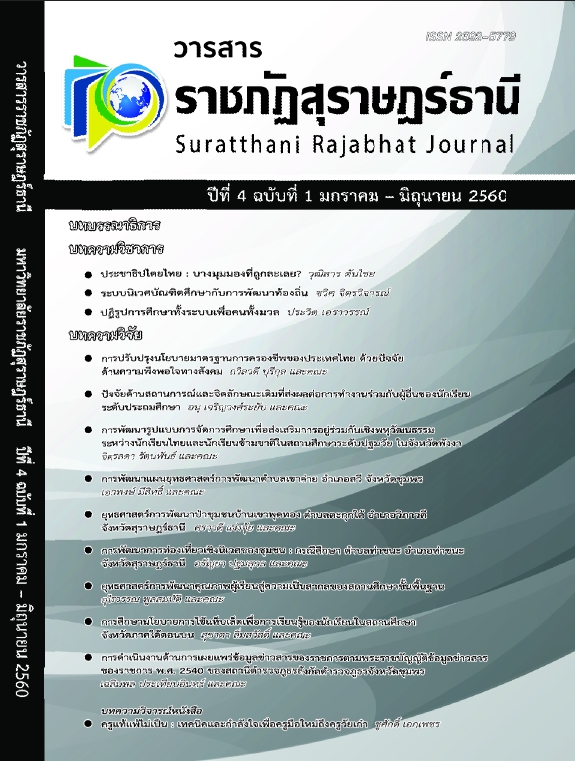A Study on the Implementation of Tablet-Based Learning Policies Used by Students in the Schools of Upper Southern Provinces
Main Article Content
Abstract
The objectives of this dissertation were to study the implementation of tablet-based learning policies for students in schools, to compare the learning outcomes regarding reading, writing, and arithmetic skills of Prathomsuksa II students between pre- and post-implementation of tablet-based learning policies for students in schools, and to propose the guidelines for implementation of tablet-based learning policies for students in schools of the Upper Southern Provinces. The procedure consisted of 3 steps as follows; Step 1 : To study the implementation of tablet-based learning policies for students in the schools of 7 schools in 7 Upper Southern Provinces. The qualitative data were collected from 21 samples including administrators, Prathomsuksa II teachers, and Prathomsuksa II parents by using an observation form of general states, an analysis form of documents, and an in-depth interview. The data were analyzed by using content analysis, pragmatic analysis, synthesis, and triangulation. Step 2: To compare the learning outcomes regarding reading, writing, and arithmetic skills of Prathomsuksa II students by comparing the focus assessments between students, whom the tablet-based learning had never been implemented with, in academic year 2012 and students, whom the tablet-based learning had already been implemented with, in academic year 2013. Step 3: To propose the guidelines for implementation of tablet-based learning policies for students in schools of the Upper Southern Provinces by relying on the findings obtained in Step 1 and Step 2. The appropriateness and feasibility of the guidelines were analyzed by 7 experts using the interview and assessment forms.
The findings showed that the implementation of tablet-based learning policies for students was unidirectional. In other words, the schools understood the objectives and goals of the policies, except for methods or guidelines being implemented to attain the objectives. Regarding policy communication, meetings were held by administrators in order to elucidate teachers and related officers about the policies. Missions and assignments specification tended to be the duty of class teachers, Prathomsuksa II teachers, and ICT or computer teachers. Regarding the supervision and monitoring of implementation of the policies, the internal supervision was held by administrators and academic supervisors and the external supervision was held by educational supervisors of each educational area. The aspects showing different implementation were organizational competency, potential and readiness of each school, especially skills and abilities in using tablets and implementing technology of teachers, and budget, locations, tools, resources used in operations and related technology. The comparison of the focus assessments between students, whom the tablet-based learning had never been implemented with in academic year 2012, and students, whom the tablet-based learning had already been implemented with in academic year 2013, showed that the learning outcomes of the students in academic year 2013 were not significantly higher than the learning outcomes of the students in academic year 2012 in all schools; the learning outcomes were higher, lower, or identical in some of the schools. Therefore, it cannot be said that the implementation of tablet-based learning for the students results in impound reading, writing, and arithmetic skills compared to the non-implementation of tablet-based learning. However, the implementation of tablet-based learning affected the accessibility to technology, which allowed both teachers and students to use technology as a learning tool. This dissertation also proposed the guidelines for the implementation of tablet-based learning policies of the students: creation of clear policies, policy communication, missions and assignments specification, development of organizational competency, and supervision and monitoring of the implementation of the policies. In addition, the guidelines for the implementation were specified for administrators, teachers, and students’ parents, as well as to provide conducive for environment an actual implementation of tablet-based learning policies.
Article Details
References
ดิลกะ ลัทธพิพัฒน์. (2555). การศึกษาประเมินผลกระทบโครงการหนึ่งคอมพิวเตอร์แท็บเล็ตต่อหนึ่งนักเรียน. กรุงเทพฯ : สถาบันวิจัยเพื่อการพัฒนาประเทศไทย.
ธีระภัทร ประสมสุขและคณะ. (2555). รูปแบบการใช้แท็บเล็ตพีซีเพื่อยกระดับคุณภาพนักเรียน ในโรงเรียนขนาดเล็ก. กรุงเทพฯ : สำนักงานคณะกรรมการการศึกษาขั้นพื้นฐาน.
แผนการบริหารราชการแผ่นดิน พ.ศ. 2555 - 2558. (2554). กรุงเทพฯ : คณะรัฐมนตรีและราชกิจจานุเบกษา.
พูลย์ชัย ยาวิราช. (2550). การพัฒนารูปแบบการนำนโยบายไปสู่การปฏิบัติสำหรับสถานศึกษาขั้นพื้นฐาน. วิทยานิพนธ์ครุศาสตรดุษฎีบัณฑิต สาขาวิชาการบริหารการศึกษา บัณฑิตวิทยาลัย จุฬาลงกรณ์มหาวิทยาลัย.
มหาวิทยาลัยศรีนครินทรวิโรฒ. (2555). รายงานผลการศึกษาฉบับสมบูรณ์ โครงการนำร่องการประยุกต์และบูรณาการคอมพิวเตอร์แท็บเล็ตเพื่อการเรียนการสอน ในระดับชั้นประถมศึกษาตามแนวนโยบายของรัฐบาล ระยะที่ 1. กรุงเทพฯ : มหาวิทยาลัยศรีนครินทรวิโรฒ.
วรเดช จันทรศร. (2548). ทฤษฎีการนำนโยบายสาธารณะไปปฏิบัติ. กรุงเทพฯ : สหายบล็อก.
วิจารณ์ พานิช. (2555). วิถีสร้างการเรียนรู้เพื่อศิษย์ในศตวรรษที่ 21. กรุงเทพฯ : ตถาตา.
สมบัติ ธำรงธัญวงศ์. (2553). นโยบายสาธารณะ: แนวความคิด การวิเคราะห์ และกระบวนการ (พิมพ์ครั้งที่ 21). กรุงเทพฯ : คณะรัฐประศาสนศาสตร์ สถาบันบัณฑิตพัฒนบริหารศาสตร์.
สำนักงานคณะกรรมการการศึกษาขั้นพื้นฐาน. (2555). แผนปฏิบัติราชการสี่ปี (พ.ศ. 2555 -2558). (Online) สืบค้นได้จาก : www.obec.go.th/node/13751 [2556, มิถุนายน 26].
สำนักติดตามและประเมินผลการจัดการศึกษาขั้นพื้นฐาน. (2556). สรุปรายงานผลและความคิดเห็นการใช้คอมพิวเตอร์พกพา (แท็บเล็ต) ตามโครงการ One Tablet per Child : OTPC ปีการศึกษา 2555. กรุงเทพฯ : ผู้แต่ง.
สำนักเทคโนโลยีเพื่อการเรียนการสอน สำนักงานคณะกรรมการการศึกษาขั้นพื้นฐาน. (2555). คู่มืออบรมปฏิบัติการบูรณาการใช้คอมพิวเตอร์พกพา(Tablet) เพื่อยกระดับการเรียน การสอน. กรุงเทพฯ : สำนักเทคโนโลยีเพื่อการเรียนการสอน.
สุริยา หมาดทิ้ง. (2557). สมรรถนะสำคัญด้าน ICT ของผู้บริหารโรงเรียนในศตวรรษที่ 21.วารสารศึกษาศาสตร์ มหาวิทยาลัยสงขลานครินทร์ วิทยาเขตปัตตานี, 25(2), 1 - 11.
Becta ICT Research. (2005). Research report: Tablet PCs in schools: Case study report. (Online) Retrieved from : http:www.oro.open.ac.uk [2013, October 13].
Bienkowski ,et al. (2005). Singapore Tablet PC Program Study : Executive Summary. (Online) Retrieved from : http : ww.ctl.sri.com/ publications/downloads/TabletPC.pdf [2013, May 28].
Mantgem, M.V. (2008). Tablet PC in K-12 Education. (Online) Retrieved from : http: www.iste.org.pdf. [2013, February 18].


